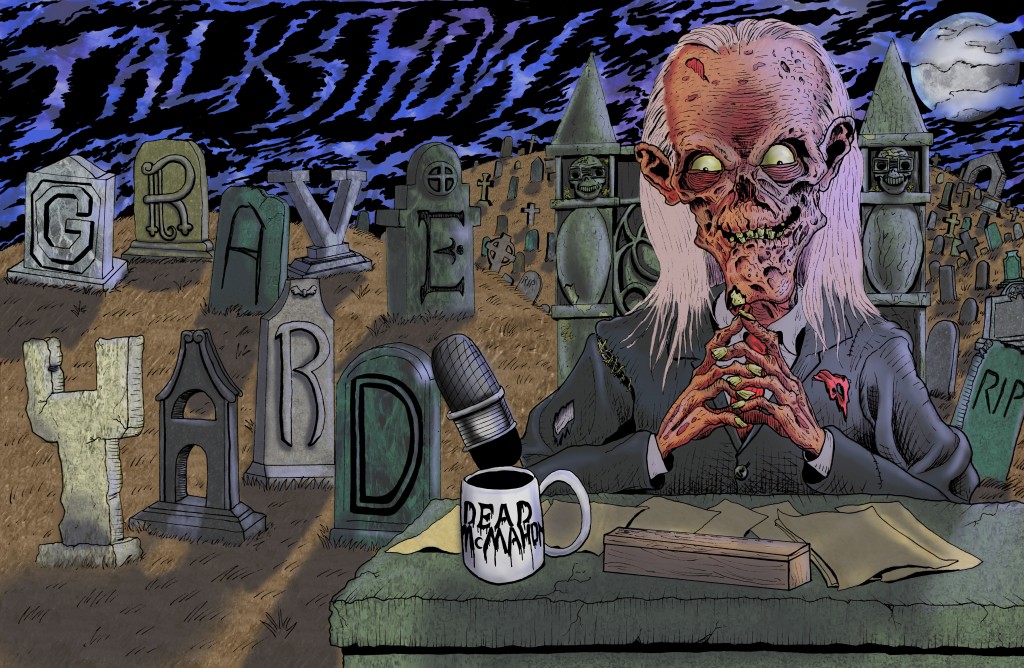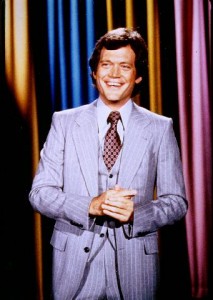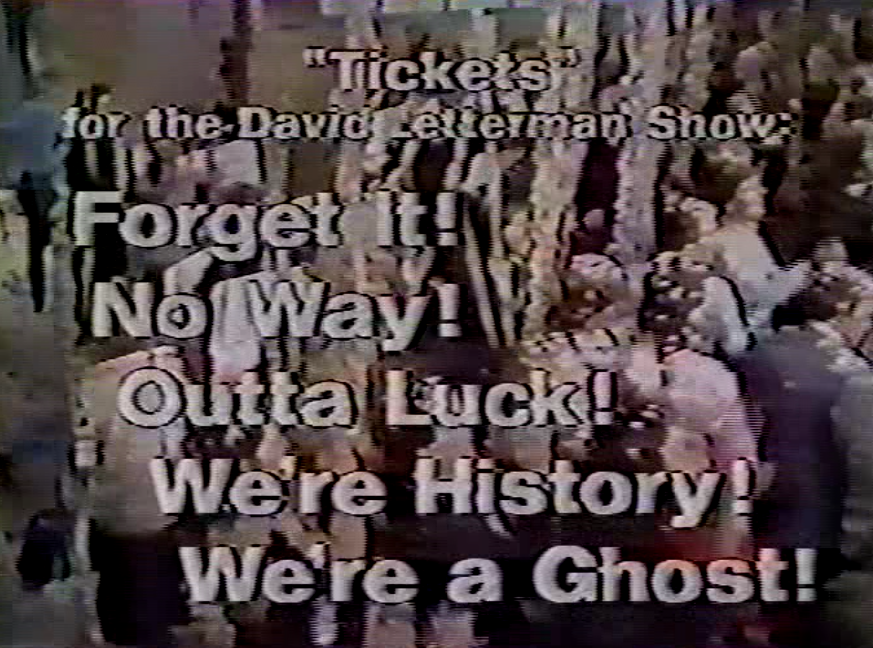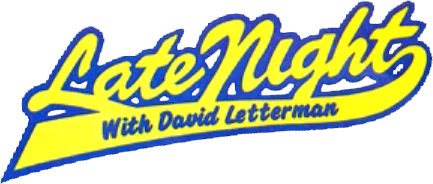Last night, May 21th, 2015, David Letterman is retired from The Late Show. A 33-year legacy has come to a close. Almost everybody is publishing stories and retrospectives and tributes about what Letterman meant to them and the medium. Of all the ones I’ve read, perhaps the best – and certainly the most concise – comes from Jon “@fart” Hendren:
david letterman to me is arguably the most uniquely american comedian and host. i respect him.his irony level may be the highest of any host
— jon hendren (@fart) May 7, 2015
What’s often lost in the fold are the details of Letterman’s early years, in particular his self-titled morning talk show. Most retrospectives gloss over it, mentioning little more than its quick cancellation. There’s a rich history to be found in its short life, though, so we’re going somewhere in the Talk Show Graveyard we’ve never gone before: the morning.
How It Started:
Letterman’s roots in broadcasting trace back to his time at Ball State University in 1965, where he briefly worked for WBST, the campus radio station. The station was supposed to be exclusively classical music, but Dave was having none of that. He hosted a show called Make It Or Break It, where he’d play rock and people would call in with their thoughts on it. If listeners didn’t like what they heard, he would break the record. Literally. A sign of things to come. He was fired from this position (not because of his record breaking antics, but because he was a bit too irreverent toward classical music for the station’s liking) and bolted to new campus radio station, WAGO. A brief clip of his 1969 April Fools’ broadcast can be heard here, and it’s pure absurdity. The caller is Michelle Cook, Letterman’s first wife.
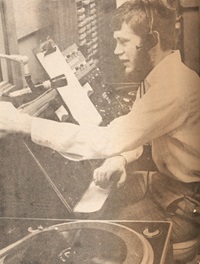
David Letterman, College Radio Edition. Though when you get right down to it, everything he’s done is professional college radio.
Not too long after graduation, Letterman landed a TV job at ABC affiliate WLWI (currently WTHR), where he held his most famous early showbiz job: weekend weatherman. His antics—including his famed prediction of hail the size of “canned hams”—have become the stuff of legend. However, this was just one of his many duties at the station. He also hosted a show called Clover Power, in which he interviewed local 4H members about their projects, and another, Freeze Dried Movies, a late night low budget movie showcase for which he’d perform sketches leading into and out of commercial breaks. In 1971, he acted as a corner reporter for the Indy 500, and interviewed Mario Andretti after he wiped out.
In 1974, Letterman either quit or was fired from WLWI (reports vary) and took up a $16,000/year job as a talk radio host, but found himself burned out by it. Wanting to break into comedy, and with the encouragement of his wife Michelle, the young couple packed up their belongings into Letterman’s red pickup and moved to Los Angeles in 1975.
Letterman started performing at the Comedy Store, and quickly became one of the top acts there. He earned a reputation as the Store’s premiere heckler tamer, shutting down everyone from random audience members to—and this is 100% true—a drunken Ringo Starr with exceptional aplomb. Within a mere six months, Letterman was hired as a writer by Jimmie Walker, and his career in national TV immediately took off. He began appearing on game shows, even shooting a pilot for one that never got picked up, and started guesting everywhere his agent could book him. He was a cast member on Mary Tyler Moore’s short lived 1977 variety show Mary, and his time there is one of the few things in the world that still embarrasses him. It’s not hard to see why. Keep your eye out for a young Michael Keaton:
Around 1977, Letterman and Michelle divorced. Dave said it had nothing to do with Hollywood and everything to do with his marriage “[running] out of steam.” Not long after, he met fellow stand-up Merrill Markoe and they began dating. She later coincidentally got a writing job for the aforementioned Mary, and as you’ll see, played a big role in his professional life. (Full disclosure: The Markoes are longtime friends of my grandparents, dating back to before Merrill’s birth.)
Talent scouts from The Tonight Show treated the Comedy Store as a farm system for the show, and they started keeping an eye on Letterman around the time he was on Mary. One year later, they decided he was ready, and Letterman made his Tonight Show debut on November 26th, 1978. He was waved over by Johnny Carson—the sure sign of Making It, though in this case it may have been prearranged—and he quickly became one of Carson’s favorite guests. By his third appearance, Letterman was tapped by the show’s producers to be a guest host, something he did twenty-odd times over the next few years. NBC President Fred Silverman was so impressed that he signed Letterman to an exclusivity contract.
In 1978, a pilot for an afternoon talk show starring Letterman was planned called Leave It To Dave. It never made it to air, and by all accounts the whole thing was an unmitigated disaster. The planned set included “a pyramid shape… with built-in benches covered with shag carpeting for Dave and his guests to sit on.” Guests sitting around on pillows was also discussed, as was guests entering by sliding down a chute into a bunch of throw pillows. Both Dave and Merrill said the whole thing looked like some sort of Egyptian themed Carpeteria trade show, and they were relieved when it got canned.
By early 1979, Carson had made it clear to NBC that he wanted to leave The Tonight Show later that year. He was sick of the grind and tried to opt out of his contract on a technicality before the end of the year, but NBC wasn’t going to let their biggest moneymaker go without a fight. Carson agreed to stay until the end of the year before entering into an arbitration hearing with NBC. Perhaps dealing with the Very Real Possibility that Carson would win the case and either retire or bolt to ABC, Silverman made a shortlist of potential Carson replacements, and admitted that Letterman was on that list.
In early 1980, NBC announced that Letterman was finally going to have his own show—a ninety-minute show, eponymously titled The David Letterman Show, live from New York…at 10 a.m. It was NBC’s attempt to shake up the morning show genre. Silverman determined the daytime audience was too old as a whole, stating “there are only so many hemorrhoid advertisers,” and they cancelled three game shows to make way for Letterman. When it was announced, Letterman claimed he was only focusing on the upcoming program, but it was widely seen as something of an audition for The Tonight Show host if Carson left. The show was guaranteed a 26-week run.
The David Letterman Show premiered on June 23, 1980.
https://www.youtube.com/watch?v=z61278cVIzU
What It Was Like:
The least “morning show” morning show that ever morning show’d. Picture David Letterman’s normal cynical humor…but at 10 a.m. The theme music was composed by ex-Doobie Brother Michael McDonald and was played by a small band.
Here’s the opening minutes from an episode. Note that it bears little resemblance to a morning show and every resemblance to a show you’d watch at, oh, say, half past midnight.
The show was also the genesis of several of Letterman’s most famous recurring segments from Late Night and The Late Show: Stupid Pet Tricks, Small Town News, and Viewer Mail, all created at least in part by Merrill Markoe. He also had a segment called “Bad News,” where he would deliver bad news to people on behalf of someone who didn’t want to say it themselves.
At some point in each program, Letterman would throw to newscaster Edwin Newman to provide news updates. He originally did the broadcast in the same studio as Letterman, but each piece of news he read was cheered and booed as if he were part of the act, so they eventually moved him to an isolated studio. He could barely hide his disdain:
The show received critical acclaim during its short run, including a recommendation from People Magazine. The Associated Press considered it a breath of fresh air in the bland daytime TV market. Right off the bat, it was noted for being different than average morning fare; on his first show, Letterman took out a TV, flipped through the channels, and discounted his competition one by one. It even managed to win two Emmys. Things got especially crazy after the show’s cancellation was announced, but we’ll get to that.
Behind the scenes, things fell apart almost immediately. Producer Bob Stewart dropped out just before the first show went to air due to conflicts with the staff. Markoe (the show’s head writer) doubled as its producer until they hired Barry Sand, who stayed with Letterman for many years after.
Notable moments include:
– Local musician Harve Mann was brought on to sing lyrics to the show’s instrumental theme. It became one of the show’s most famous moments. Who exactly is Harve Mann and how did he get involved? That’s a fascinating story in its own right, and you can read it straight from the horse’s mouth here.
– This interview with Andy Kaufman, a man who could never give a “normal interview” (especially when Letterman was involved) and this is no exception. To this today, it’s one of Markoe’s favorites.
– An entire segment of a show was an anniversary party for the Kotinoffs (either their fortieth or fiftieth, depending on the account), a couple from Long Island who were written into the show. There was cake, dancing and singing, and the whole party was meant to hit a high point where sparklers were lit and flower petals fell from the ceiling. Everything was fine…until the petals met the sparklers and started setting small fires. A stagehand came out with a fire extinguisher, but it didn’t help. All the while, the wedding singer kept singing without missing a beat, and Dave announced tomorrow’s guests. Dave and Merrill were worried about the repercussions of setting a show on fire, but both broke out laughing when they saw the finished product.
– This interview with The Mothman Prophecies and UFOlogist author John Keel. Is he on to something or is he not playing with a full bag of jacks? Perhaps both? YOU DECIDE!
– This interview with electronic music innovator Suzanne Ciani. If the name sounds familiar, she’s the one who made sound effects for the disco version of the Star Wars theme and the “swoosh” effect to Afternoon Delight. Here she is showing off her equipment to Dave:
– The show held a “Why The David Letterman Show Should Originate From My Home” contest. About 8,000 people entered. The winner was Jane Goldsworthy of Cresco, Iowa, and true to his word, Dave flew out and filmed an episode out of her home. There’s no video of it online, but tapes of it were circulating as recently as 1996.
– This interview with Steve Martin, in which Martin gets wheeled out for the interview on a bed holding beers. It just gets wackier:
– The show flew in a farmer from Collins, Missouri named Floyd Stiles who had never been to New York before, and held a “Floyd Stiles Day” in his honor. Why? Stiles’s hometown newspaper mistakenly printed such a thing was going to happen, and Letterman decided to run with it.
Why It Ended:
What else? Low ratings. The show’s strength—Dave’s cynical humor and irreverence toward the talk show genre—was also its downfall: it’s not what people wanted to see at 10 a.m., especially not for the target demographic for that time slot, which is housewives and children. Markoe got into many arguments with the producers—they were trying to tell her what women wanted, and she countered that she was the only woman there. She still stands by this, but acknowledges that she didn’t have access to the same demographic data they did.
Several things were tried to save the show. It was cut down from 90 minutes to an hour. Fred Silverman tried to get them to hire an Arthur Godfrey-esque “family” of performers. Alas, the show had already been dropped in several major markets, including Boston, Detroit, and San Francisco, and it’s difficult to come back from that big a hit in viewership.
During a guest appearance, Tom Snyder accidentally let slip the show was cancelled, and official word came in a few days later.
The show had already built up something of a cult following, but the news of its cancellation energized it. While devastated behind the scenes, the staff decided to have fun with it and do as many ridiculous things as they could get away with in their remaining time.
Fans protested the cancellation, and the studio was packed with people watching what insanity a doomed show could pack in. College students hitched across the country with petitions to keep Dave on air. Long Island housewives threatened to block traffic until NBC relented. A Chicago businessman traveled cross country to hand out “Save Dave” leaflets.
Much of the show’s wackiest material, like the aforementioned anniversary party, show from Iowa, and Floyd Stiles Day, all happened after the cancellation was announced.
The final show’s bumpers featured the staff’s resumes. The show ended with the return of Harve Mann, singing made up lyrics for Las Vegas Gambit, one of the game shows set to replace them.
The final episode was broadcast October 24, 1980, a mere four months into the show’s contract.
The Aftermath:
Letterman was devastated by the show’s failure and thought his career in TV was over. A brief respite came in the form of a telegram from Martin Scorsese and the cast of Raging Bull, stating that Dave had been a source of relief for them all, and that they were sad to see him go. NBC President Fred Silverman still thought highly of Letterman; upon hearing that Dave was being courted by a syndication company, he locked him into a holding contract: Letterman was paid $20,000 a week to sit tight until NBC found a place for him in the lineup.
Back on May 2, 1980, Carson had resolved his differences with NBC and worked out a contract. One of its contingencies was that he now had control over the one hour slot after Tonight. In November of 1981, Carson Productions announced the creation of Late Night With David Letterman. Tom Snyder’s Tomorrow show was cancelled to make way for it, partly because Snyder didn’t want to move even later and partly because of an ongoing feud with his co-host. Letterman was back on the air and busy reinventing the talk show genre.
Markoe, who broke up with Dave in the mid eighties and started doing freelance writing, states that Letterman’s morning show cancellation scarred him, and when he started Late Night, he worried every day that he could be cancelled at any moment.
It never happened. Dave’s going on the same way he came in: on his own terms.
Visit other monuments in the Talk Show Graveyard! Header art by Ing. Check out Ing’s website and store!

